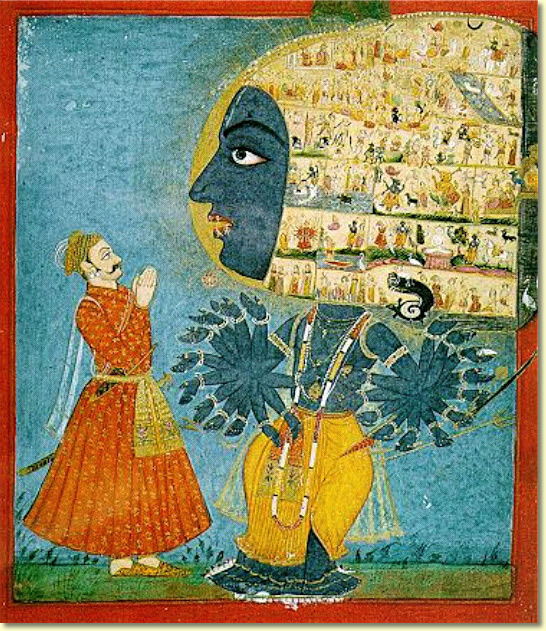![]() Chapter
14: The
System of Universal Management
Chapter
14: The
System of Universal Management
 (1)
The king
said: 'Oh great sage, can you please describe to me the activities in
which all these Manus and the others are engaged during
each manvantara and who prescribes them?'
(1)
The king
said: 'Oh great sage, can you please describe to me the activities in
which all these Manus and the others are engaged during
each manvantara and who prescribes them?'(2) The rishi said: 'Oh King, the Manus and all their sons, the sages, the Indras and the godly ones no doubt all resort under the rule of the Original Person. (3) The Lord of Sacrifice Yajña and the other incarnations of the Supreme Personality I already discussed oh King, constitute the lead followed by the Manus and others in charge of the universal affairs. (4) In disregard of the penance as [exemplified] by the sages, in the course of a mahâyuga the Vedic instruction is lost that promotes the sanâtana dharma [the customary Vedic duties according to status and vocation, see also 3.12: 41]. (5) With that in mind the Manus are engaged for as long as they are present in this world, in directly establishing this fourfold dharma as instructed by the Lord, oh ruler of man [see also B.G. 4: 1]. (6) Till the end of the era the rulers of the universe [the heirs of Manu] execute that order even as the demigods and the other divisions of enjoyers of the results of the sacrifices do this [see also B.G. 4: 2]. (7) Indra maintains all the places of the three worlds by providing all the rain that the world needs and [thus] enjoys the excellent opulence of the three worlds that is given by the Supreme Lord. (8) In every yuga the Lord assumes the forms of liberated persons [the perfected ones or the Siddhas] to explain the transcendental knowledge, He assumes the forms of great saints [rishis] to explain what karma entails [performing rituals] and He assumes the forms of great lords of yoga in order to teach the science of unifying in consciousness. (9) In the form of the founding fathers [the Prajâpatis] He creates offspring, to annihilate the miscreants He assumes the form of kings and in the form of time He is there to put an end to everything that grew different following the modes of nature. (10) People who under the influence of mâyâ are bewildered by the illusion of His names and forms and [approach Him with] different views [dars'anas] are looking for Him but cannot find Him [compare B.G. 18: 66]. (11) With all these changes [of the Manus in so-called vikalpas] that I described as taking place in one day of Brahmâ [one kalpa] I [thus] reported about the fourteen manvantaras the scholars speak about.'

